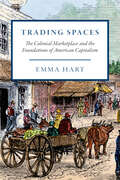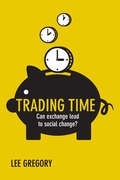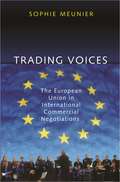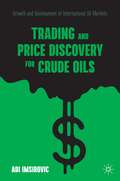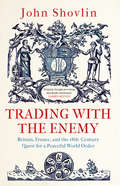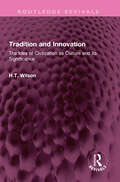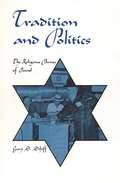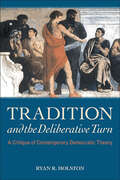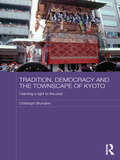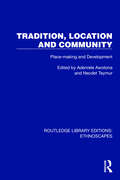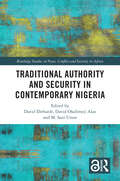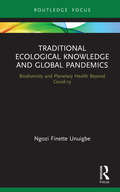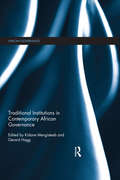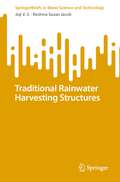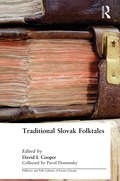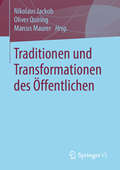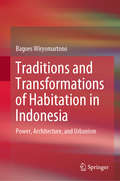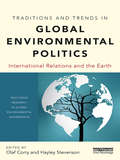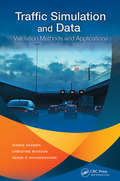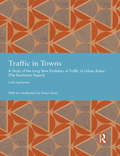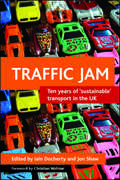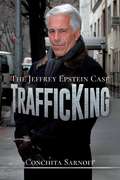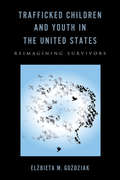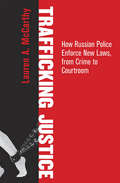- Table View
- List View
Trading Spaces: The Colonial Marketplace and the Foundations of American Capitalism (American Beginnings, 1500–1900)
by Emma Hart“A compelling addition to the history of capitalism . . . reminds us that globalization’s current realities have deep roots in the early modern era.” —Margaret Newell, author of Brethren by Nature: New England Indians, Colonists, and the Origins of American SlaveryWhen we talk about the economy nowadays, “the market” is usually just an abstraction, but historically, the exchange of goods was tied to a particular place. Capitalism has gradually eroded this connection to create our current global trading systems. In Trading Spaces, Emma Hart argues that Britain’s colonization of North America was a key moment in the market’s shift from place to idea, with major consequences for the character of the American economy.Hart’s book takes in the shops, auction sites, wharves, taverns, fairs, and homes of seventeenth- and eighteenth-century America—places where new mechanisms and conventions of trade arose as Europeans re-created or adapted continental methods to new surroundings. Since those earlier conventions tended to rely on regulation more than their colonial offspring did, what emerged in early America was a less fettered brand of capitalism. By the nineteenth century this had evolved into a market economy that would not look too foreign to contemporary Americans.To tell this complex transnational story of how our markets came to be, Hart looks back further than most historians of US capitalism, rooting these markets in the norms of seventeenth- and eighteenth-century Britain. Perhaps most important, this is not a story of specific commodity markets over time but rather a history of the trading spaces themselves: the physical sites in which the grubby work of commerce occurred and where the market itself was born.“Providing detailed examination of evidence from sources such as newspapers, broadsides, court testimonies, maps, and private journals, Hart convincingly recreates what that early modern trading world looked like at the ground level, from the colonial era through the early American republic.” —Journal of British Studies“Her work starts a conversation that one hopes others will continue.” —The Journal of Southern History
Trading Time: Can Exchange Lead to Social Change?
by Lee GregoryWelfare reform in the wake of austerity has fostered increased interest in self-help initiatives within the community sector. Amongst these, time banking, one of a number of complementary currency systems, has received increasing attention from policy makers as a means for promoting welfare reform. This book is the first to look at the concept of time within social policy to examine time banking theory and practice. By drawing on the social theory of time to examine the tension between time bank values and those of policy makers, it argues that time banking is a constructive means of promoting social change but is hindered by its co-option into neo-liberal thinking. This book will be valuable for academics/researchers with an interest in community-based initiatives, the third/voluntary sectors and theoretical analysis of social policy and political ideologies.
Trading Voices: The European Union in International Commercial Negotiations
by Sophie MeunierThe European Union, the world's foremost trader, is not an easy bargainer to deal with. Its twenty-five member states have relinquished most of their sovereignty in trade to the supranational level, and in international commercial negotiations, such as those conducted under the World Trade Organization, the EU speaks with a "single voice." This single voice has enabled the Brussels-based institution to impact the distributional outcomes of international trade negotiations and shape the global political economy. Trading Voices is the most comprehensive book about the politics of trade policy in the EU and the role of the EU as a central actor in international commercial negotiations. Sophie Meunier explores how this pooling of trade policy-making and external representation affects the EU's bargaining power in international trade talks. Using institutionalist analysis, she argues that its complex institutional procedures and multiple masters have, more than once, forced its trade partners to give in to an EU speaking with a single voice. Through analysis of four transatlantic commercial negotiations over agriculture, public procurement, and civil aviation, Trading Voices explores the politics of international trade bargaining. It also addresses the salient political question of whether efficiency at negotiating comes at the expense of democratic legitimacy. Finally, this book looks at how the EU, with its recent enlargement and proposed constitution, might become an even more formidable rival to the United States in shaping globalization.
Trading and Price Discovery for Crude Oils: Growth and Development of International Oil Markets
by Adi ImsirovicThis is a book about the international oil market. It takes a historical perspective on how the market emerged, developed, and became what it is today—the biggest commodity market in the world. It is mature and complex, but far from perfect. Throughout most of its 150-year history, the oil market has been monopolised by companies and governments. For only a fraction of that, oil traded in a relatively free market. As a result, we had to live with ‘big oil’, economic shocks, high oil prices, instability and wars. Using a simple concept of market power, this book will explain the meaning of ‘oil price’ and how it is established while offering a valuable lesson for other commodities.Market power is the key to understanding the ‘price of oil’. This book uses a simple concept of price-makers and price-takers to examine the evolution of oil markets, their structure, and prices. The early decades of the oil industry were competitive with low barriers to entry. Barely 25 years later, the Standard Oil company created a refining monopoly, buying oil at its own ‘posted’ price. In the following century, the cartel of major oil companies, helped by their governments, did the same at the international level. OPEC helped producing governments regain control of their own resources, but the organisation was never able to retain a similar level of control. After 1986 price collapse, OPEC abdicated the price-making function in favour of the market. While it never gave up attempts to influence prices, OPEC had to link their official prices to one of the global oil benchmarks. Modern international oil markets function because of oil benchmarks such as Brent, WTI and Dubai. This book showcases:• How oil traders played a prominent role in development of the industry• How policies of consuming nations helped oil cartels• Why and how the US price of oil was negative• How AI has changed the way markets operate and the way in which the markets are likely to change in futureThis book explores how oil markets grew, functioned, and have occasionally failed to do their job. The ecosystem of derivatives or ‘paper barrels’ trading in far greater volume than physical oil plays a very important role in mitigating risk. With this core tenant, setting the ‘price of oil’ is explained in detail.
Trading with the Enemy: Britain, France, and the 18th-Century Quest for a Peaceful World Order
by John ShovlinA ground-breaking account of British and French efforts to channel their eighteenth-century geopolitical rivalry into peaceful commercial competition Britain and France waged war eight times in the century following the Glorious Revolution, a mutual antagonism long regarded as a &“Second Hundred Years&’ War.&” Yet officials on both sides also initiated ententes, free trade schemes, and colonial bargains intended to avert future conflict. What drove this quest for a more peaceful order? In this highly original account, John Shovlin reveals the extent to which Britain and France sought to divert their rivalry away from war and into commercial competition. The two powers worked to end future conflict over trade in Spanish America, the Caribbean, and India, and imagined forms of empire-building that would be more collaborative than competitive. They negotiated to cut cross-channel tariffs, recognizing that free trade could foster national power while muting enmity. This account shows that eighteenth-century capitalism drove not only repeated wars and overseas imperialism but spurred political leaders to strive for global stability.
Tradition and Innovation: The Idea of Civilization as Culture and Its Significance (Routledge Revivals)
by H.T. WilsonFirst published in 1984 Tradition and Innovation by viewing Western civilization as a culture, puts the common perspectives of our major Western institutions in bolder relief. The author shows how the institutionalization of central modes of Western rationality-found in capitalism, industrialization, science, science - based technology, bureaucracy, the rule of law, the social and behavioral sciences-has created a culturally and historically unique form of collective life: advanced industrial society. Indicative of this development is the nature and meaning of the so-called innovative society itself, where rationality is increasingly seen to repose in institutions and organized structures rather than in individuals. Professor Wilson argues that this rationality is becoming traditionalized as a central artifact of our form of life, one which believes in the independent existence of the ‘facts of life’. This is borne out by the increasing autonomy of what professor Wilson calls ‘disembodied disciplined observation’, determined as it is to annihilate contemplation and reflection in its effort to reconstitute practice in its own image. This is an interesting read for students of sociology, political science, public administration, and social science in general.
Tradition and the Deliberative Turn: A Critique of Contemporary Democratic Theory
by Ryan R. HolstonThis book changes the narrative regarding democratic deliberation. It does so by bringing to bear insights into the nature of morality and discourse associated with one of the twentieth century's foremost philosophers of history, Hans-Georg Gadamer. Tradition and the Deliberative Turn thus reframes the discussion about deliberative democracy with a robust historical sensibility, which has largely been missing from this conversation. Gadamer's "rehabilitation" of tradition shows how the concrete ethical life does not merely occlude but also facilitates moral understanding, providing a particular vantage point from which we perceive the world. What other scholars have overlooked is that such a perspective is therefore always limited. Drawing on Gadamer's practical philosophy, an underappreciated element in his corpus, Ryan R. Holston argues for the need to cultivate these historically-rooted and local relationships and the shared meanings to which they give life.
Tradition, Democracy and the Townscape of Kyoto: Claiming a Right to the Past (Japan Anthropology Workshop Series)
by Christoph BrumannAs the historic capital of the country and the stronghold of the nation’s most celebrated traditions, the city of Kyoto holds a unique place in the Japanese imagination. Widely praised for the beauty of its townscape and natural environments, it is both a popular destination for tourists and home to one and a half million inhabitants. There has been a sustained, lively debate about how best to develop the city, with a large number of local government officials, citizen activists, urban planners, real-estate developers, architects, builders, proprietors, academic researchers, and ordinary Kyotoites involved in discussions, forming a highly peculiar social arena that has no match elsewhere in Japan. This book, based on extensive fieldwork and interviews, provides an ethnographic study of this particular social field. It analyses how people in Kyoto deal with their most cherished traditions, such as the traditional town houses and the famous Gion matsuri festival, which calls into question several of the standard social scientific assumptions about the functions of cultural heritage for present-day societies. The book looks at the way concerned citizens, government bureaucrats, and other important players interact with each other over contentious modern buildings, often with the best intentions but constrained by set role expectations and by the superior power of national-level regulations and agencies. This book contributes to debates on the social uses of tradition and heritage, and the question of how to create sustainable, liveable urban environments.
Tradition, Location and Community: Place-making and Development (Routledge Library Editions: Ethnoscapes)
by Adenrele Awotona Necdet TeymurOriginally published in 1997, as part of the Ethnoscapes: Current Challenges in the Environmental Social Sciences series, reissued now with a new series introduction, Tradition, Location and Community: Place-making and Development brings together the selected papers of seventeen architects, social scientists and planners. It offers a range of original perspectives on the relationship between the design and habituation of the built environment on the one hand and social and cultural development on the other. As an archival volume, it attempts to present a mixture of cross-disciplinary and cross-cultural perspectives. It explores the view that planning and design (the organization of the physical/built environment) which follow from the rapid transformations wrought by development must respond to, and be based on, the wants and needs of the people affected; that is, it must be in accord with their notions of environmental quality.Divided into two sections. The first section has five chapters which explore the theoretical and conceptual aspects of place-making and development. Section two consists of twelve chapters, each of which presents a case study.
Traditional Authority and Security in Contemporary Nigeria (Routledge Studies in Peace, Conflict and Security in Africa)
by David Ehrhardt, David Oladimeji Alao and M. Sani UmarExploring the contentious landscape of Nigeria’s escalating violence, this book describes the changing roles of traditional authorities in combatting contemporary security challenges. Set against a backdrop of widespread security threats – including insurgency, land disputes, communal violence, regional independence movements, and widespread criminal activities – perhaps more than ever before, Nigeria’s conventional security infrastructure seems ill-equipped for the job. This book offers a fresh, empirical analysis of the roles of traditional authorities – including kings, Ezes, Obas, and Emirs – who are often hailed as potent alternatives to the state in security governance. It complicates the assumption that these traditional leaders, by virtue of their customary legitimacy and popular roots, are singularly effective in preventing and managing violence. Instead, in exploring their creative adaptation to governance roles after a dramatic postcolonial downturn, this book argues that traditional leaders can augment, but not substitute, the state in addressing insecurity. This book’s in-depth analysis will be of interest to researchers and policy makers across African and security studies, political science, anthropology, and development. David Ehrhardt is an Associate Professor of International Development at Leiden University, The Netherlands. His main research interests are African governance and educational innovation. David has published extensively on Nigeria and co-leads the Learning Mindset project that promotes autonomous learning in higher education. David Oladimeji Alao is a Professor in the Department of Political Science and Public Administration, and Chief of Staff to the President/Vice Chancellor, Babcock University, Ogun State, Nigeria. Professor Alao has authored several articles and 3 edited books. M. Sani Umar is a Professor in the Department of History and Diplomatic Studies, University of Abuja, Nigeria. His research centres on religious vio- lence and peace building, with a focus on understanding the roots of religious conflict and the dynamics of religious pluralism.
Traditional Ecological Knowledge and Global Pandemics: Biodiversity and Planetary Health Beyond Covid-19 (Routledge Focus on Environment and Sustainability)
by Ngozi Finette UnuigbeThis book demonstrates the importance and potential role of Traditional Ecological Knowledge in foreseeing and curbing future global pandemics. The reduction of species diversity has increased the risk of global pandemics and it is therefore not only imperative to articulate and disseminate knowledge on the linkages between human activities and the transmission of viruses to humans, but also to create policy pathways for operationalizing that knowledge to help solve future problems. Although this book has been prompted by the COVID-19 pandemic, it lays a policy foundation for the effective management or possible prevention of similar pandemics in the future. One effective way of establishing this linkage with a view to promoting planet health is by understanding the traditional ecological knowledge of indigenous peoples with a view to demonstrating the significant impact it has on keeping nature intact. This book argues for the deployment of traditional ecological knowledge for land use management in the preservation of biodiversity as a means for effectively managing the transmission of viruses from animals to humans and ensuring planetary health. The book is not projecting traditional ecological knowledge as a panacea to pandemics but rather accentuating its critical role in the effective mitigation of future pandemics. This book will be of great interest to students and scholars of traditional ecological knowledge, indigenous studies, animal ecology, environmental ethics and environmental studies more broadly.
Traditional Institutions in Contemporary African Governance (African Governance)
by Kidane Mengisteab Gerard HaggMost African economies range from moderately advanced capitalist systems with modern banks and stock markets to peasant and pastoral subsistent systems. Most African countries are also characterized by parallel institutions of governance – one is the state sanctioned (formal) system and the other is the traditional system, which is adhered to, primarily but not exclusively, by the segments of the population in the subsistence peasant and pastoral economic systems. Traditional Institutions in Contemporary African Governance examines critical issues that are largely neglected in the literature, including why traditional institutions have remained entrenched, what the socioeconomic implications of fragmented institutional systems are, and whether they facilitate or impede democratization. The contributors investigate the organizational structure of traditional leadership, the level of adherence of the traditional systems, how dispute resolution, decision-making, and resource allocation are conducted in the traditional system, gender relations in the traditional system, and how the traditional institutions interact with the formal institutions. Filling a conspicuous gap in the literature on African governance, this book will be of great interest to policy makers as well as students and scholars of African politics, political economy and democratization.
Traditional Rainwater Harvesting Structures (SpringerBriefs in Water Science and Technology)
by Joji V.S. Reshma Susan JacobThis book contains detailed information about the traditional rainwater structures. Harvesting rainwater is becoming as a practical adaptation strategy for urban areas that are vulnerable to climate alteration. In the past, rainwater harvesting was more significant than it is today. Studies show that a variety of traditional and age-old rainwater gathering techniques were created or put into use in reaction to earlier climate change incidents. According to history, both floods and droughts were frequent occurrences in ancient India. Perhaps this explains why each region of the nation has its own traditional water gathering practices that are representative of the local physical and cultural diversity. All of these methods can be seen as a concept of harvesting rain whenever and wherever it falls. Water makes up 70.9 % of the Earth's surface, mainly in the form of oceans and seas. Water is found in modest proportions as 1.7 % groundwater, 1.7 % glaciers and ice caps in Antarctica and Greenland, vapour, clouds (ice and liquid water suspended in air), and 0.001% precipitation in the air. Evaporation, transpiration, evapo-transpiration, condensation, precipitation, root absorption, percolation, infiltration, base flow and runoff are processes that water goes through on its way to the sea.
Traditional Slovak Folktales
by David L. CooperThis delightful collection makes the rich but little-known Slovak folk culture available for English-language readers. Most of the fifty tales assembled here from the collections of folklorist Pavol Dobsinsky are translated into English for the first time. The poetic qualities of the originals have been carefully preserved. The general reader will enjoy these tales immensely, and students will find an insightful introduction to the genres of the folktale and the specifics of Slovak tales. For expert readers, all of the tales have been classified according to the Aarne-Thompson index, and many include short commentaries that draw on the work of Viera Gasparikova.
Traditional Slovak Folktales (Folklores And Folk Cultures Of Eastern Europe Ser.)
by Terry L CooperThis delightful collection makes the rich but little-known Slovak folk culture available for English-language readers. Most of the fifty tales assembled here from the collections of folklorist Pavol Dobsinsky are translated into English for the first time. The poetic qualities of the originals have been carefully preserved. The general reader will enjoy these tales immensely, and students will find an insightful introduction to the genres of the folktale and the specifics of Slovak tales. For expert readers, all of the tales have been classified according to the Aarne-Thompson index, and many include short commentaries that draw on the work of Viera Gasparikova.
Traditionen und Transformationen des Öffentlichen
by Marcus Maurer Nikolaus Jackob Oliver QuiringAuf nur wenige Epochen trifft das Schlagwort von der Transformation der Öffentlichkeit besser zu als auf die Gegenwart. Traditionelle Foren öffentlicher Kommunikation ändern sich und werden durch neue ergänzt. Die korrespondierenden Prozesse verändern die Teilhabe an und den Umgang mit öffentlicher Kommunikation. Es entstehen neue Herausforderungen und Probleme für die Gesellschaft und ihre Akteure. Das Buch adressiert diesen Wandel aus verschiedenen Blickwinkeln der Kommunikationsforschung. Zentrale Fragen lauten u.a.: Welche Folgen hat die Digitalisierung der öffentlichen Kommunikation? Welche Herausforderungen bringt die wachsende Polarisierung des öffentlichen Diskurses mit sich? Wie entwickeln sich soziale Wahrnehmungen und Medienwirkungsprozesse angesichts des beschriebenen Wandels? Wie passen sich gesellschaftliche Akteure an und welche Folgen hat der Wandel?
Traditions and Transformations of Habitation in Indonesia: Power, Architecture, and Urbanism
by Bagoes WiryomartonoThis book raises the issue of the practice of patrimonial power with a focus on habitations, particularly in the urban areas of Indonesia. An assemblage of interdisciplinary studies within the framework of environmental humanities, covering the arts, architecture, urban studies, geography, cultural anthropology, and sociology, this multifaceted framework divulges the interactive connectivity between Indonesia’s patrimonial culture and the socio-culturally constructed system of habitation. The interdisciplinary study of the pertinent practices of patrimonial power that have been represented and been manifested by various political and traditional regimes in terms of the built environment and habitation in Indonesia contributes to a new understanding of Indonesian urban spatial development, from the pre-colonial era to the present. The book poses that in order to understand the politics of Indonesia, one must understand the culture and tradition of the political leadership of the country. The author presents such an understanding in exploring and unpacking the relationship between people and place that constructs, develops, sustains, and conserves Indonesian culture and traditions of habitation. This book is of interest to graduate scholars and researchers in Asian Studies in numerous disciplines, including urban studies, urban planning and design, political science, architecture, anthropology of space, public administration, and political philosophy.
Traditions and Trends in Global Environmental Politics: International Relations and the Earth (Routledge Research in Global Environmental Governance)
by Hayley Stevenson Olaf CorryHow can a divided world share a single planet? As the environment rises ever higher on the global agenda, the discipline of International Relations (IR) is engaging in more varied and transformative ways than ever before to overcome environmental challenges. Focusing in particular on the key trends of the past 20 years, this volume explores the main developments in the global environmental crisis, with each chapter considering an environmental issue and an approach within IR. In the process, adjacent fields including energy politics, science and technology, and political economy are also touched on. Traditions and Trends in Global Environmental Politics is aimed at anybody interested in the key international environmental problems of the day, and those seeking clarification and inspiration in terms of approaches and theories that decode how the environment is accounted for in global politics. It will be an essential resource for students and scholars of global environmental politics and governance, environmental studies and IR.
Traffic Simulation and Data: Validation Methods and Applications
by Winnie Daamen Christine Buisson Serge P. HoogendoornA single source of information for researchers and professionals, Traffic Simulation and Data: Validation Methods and Applications offers a complete overview of traffic data collection, state estimation, calibration and validation for traffic modelling and simulation. It derives from the Multitude Project-a European Cost Action project that incorpo
Traffic in Towns: A Study of the Long Term Problems of Traffic in Urban Areas (Studies in International Planning History)
by Colin BuchananTraffic in Towns, also known as the Buchanan Report, is regarded as one of the most influential planning documents of the twentieth century. The report reflected mounting concern about the impact on Britain’s towns and cities of rapid growth in the ownership and use of motor vehicles. Its purpose was to evaluate policy options for reducing the threat of traffic congestion to urban circulation and quality of life. Two main conclusions were drawn from the report: firstly, the need for large-scale reconstruction to make Britain’s cities fit for the ‘motor age’, including split-level megastructures and urban motorways; and secondly, the simultaneous need to preserve parts of the city, especially residential areas as car-free zones or ‘environmental areas’. In Britain, successive governments drew back from implementing the full recommendations of the Study Group, despite initial cross-party support. The prohibitive cost of city-centre redevelopment and motorway construction meant a ‘comprehensive’ solution to the problem of urban traffic on Buchanan lines was never attempted. However, local authorities in a variety of British cities, such as Glasgow, Leicester and Leeds took up aspects of the Report. Internationally, too, the Report had a major impact in countries such as Sweden, Italy and Australia. In the longer term, the influence of the Report may be best judged by the incremental changes it set in train such as pedestrianization of city centres, traffic calming, and other measures linked to Buchanan’s concept of ‘environmental areas’. In focusing attention on the effects of mass motorization on the urban environment Traffic in Towns set the terms of debate for a generation, pre-figuring recent discussion about the car and urban sustainability.
Traffic jam: Ten years of 'sustainable' transport in the UK
by Iain Docherty and Jon ShawThis informed and lively book offers a timely analysis of the UK government's sustainable - or subsequently 'integrated' - transport policy 10 years after the publication of A New Deal for Transport: Better for Everyone. Written by prominent transport experts and with a foreword by Christian Wolmar, the book identifies the modest successes and, sadly, the far more significant failures in government policy over the last decade. The authors also uncover why it has proved so difficult to adopt a more sustainable approach to transport and break Britain's love-affair with the car. The book reviews the links between the idea of sustainability and transport policy, and provides an up-to-the-minute analysis of the political realities surrounding the delivery of a sustainable transport agenda in the UK. It picks up on the principal components of A New Deal for Transport and evaluates to what extent these have, or haven't, been delivered in England, Scotland, Wales and Northern Ireland. The contributors analyse why delivering sustainable transport policies seems to present particular difficulties to ministers across the UK, and considers the UK's experience in an international perspective. The book draws lessons from the last 10 years in order to better inform future policy development. Traffic Jam is an indispensable analysis of the difficulties involved in turning policy ideals into practical reality, and as such will be of interest to scholars, students, planners, policy analysts and policy makers.
TrafficKing: The Jeffrey Epstein Case
by Conchita SarnoffAdvocate and abolitionist Conchita Sarnoff risked her life to tell the truth about a Wall Street billionaire hedge fund manager who is now a level-3 registered sex offender. TrafficKing uncovers a child sex trafficking case of epic proportions and the longest-running human trafficking case in U.S. legal history—more poignant than the Lewinsky case, Watergate scandal, and Profumo affair combined. Eleven years after the registered level-3 sex offender was arrested, four cases associated with his 2005 criminal investigation remain open. The pedophile was not prosecuted under The Trafficking Victims Protection Act (TVPA), a law enacted in Florida in 2000. In this gripping exposé, Sarnoff finds out why. TrafficKing is a true story exposing the dark side of the human condition: avarice, lust, power, and influence peddling at the highest levels of government.
Trafficked Children and Youth in the United States: Reimagining Survivors
by Elzbieta M. GozdziakTrafficked children are portrayed by the media--and even by child welfare specialists--as hapless victims who are forced to migrate from a poor country to the United States, where they serve as sex slaves. But as Elzbieta M. Gozdziak reveals in Trafficked Children in the United States, the picture is far more complex. Basing her observations on research with 140 children, most of them girls, from countries all over the globe, Gozdziak debunks many myths and uncovers the realities of the captivity, rescue, and rehabilitation of trafficked children. She shows, for instance, that none of the girls and boys portrayed in this book were kidnapped or physically forced to accompany their traffickers. In many instances, parents, or smugglers paid by family members, brought the girls to the U.S. Without exception, the girls and boys in this study believed they were coming to the States to find employment and in some cases educational opportunities. Following them from the time they were trafficked to their years as young adults, Gozdziak gives the children a voice so they can offer their own perspective on rebuilding their lives--getting jobs, learning English, developing friendships, and finding love. Gozdziak looks too at how the children's perspectives compare to the ideas of child welfare programs, noting that the children focus on survival techniques while the institutions focus, not helpfully, on vulnerability and pathology. Gozdziak concludes that the services provided by institutions are in effect a one-size-fits-all, trauma-based model, one that ignores the diversity of experience among trafficked children. Breaking new ground, Trafficked Children in the United States offers a fresh take on what matters most to these young people as they rebuild their lives in America.
Trafficking Justice: How Russian Police Enforce New Laws, from Crime to Courtroom
by Lauren A. McCarthyIn response to a growing human trafficking problem and domestic and international pressure, human trafficking and the use of slave labor were first criminalized in Russia in 2003. In Trafficking Justice, Lauren A. McCarthy explains why Russian police, prosecutors, and judges have largely ignored this new weapon in their legal arsenal, despite the fact that the law was intended to make it easier to pursue trafficking cases. Using a combination of interview data, participant observation, and an original dataset of more than 5,500 Russian news media articles on human trafficking cases, McCarthy explores how trafficking cases make their way through the criminal justice system, covering multiple forms of the crime—sexual, labor, and child trafficking—over the period 2003–2013. She argues that to understand how law enforcement agencies have dealt with trafficking, it is critical to understand how their "institutional machinery"—the incentives, culture, and structure of their organizations—channels decision-making on human trafficking cases toward a familiar set of routines and practices and away from using the new law. As a result, law enforcement often chooses to charge and prosecute traffickers with related crimes, such as kidnapping or recruitment into prostitution, rather than under the 2003 trafficking law because these other charges are more familiar and easier to bring to a successful resolution. In other words, after ten years of practice, Russian law enforcement has settled on a policy of prosecuting traffickers, not trafficking.
